
 中文
中文

FOSTERING A RESPONSIBLE CULTURE
1. Occupational Health and Safety
We are committed to providing a healthy and safe environment for our employees, guests and on-site contractors. To achieve this, we adopt a systematic approach aligning with the ISO 45001 (Occupational health and safety) management system to identify and assess health and safety risks and allocate appropriate resources to manage those risks. As our baseline, NagaWorld complies with the relevant laws and regulations on health and safety set out in Cambodia’s Labour and Employment Law.
1.1 Fostering a Safety Culture
To cultivate a strong workplace safety culture, our employees must be well-informed about the safety protocols of their SOPs. We aim to equip them with the capability to make informed decisions that prioritise their safety as well as the safety of others. We engage our staff on safety through:
- Quarterly OSHA newsletters
- Safety awareness programmes and quizzes in the staff cafeterias
- New Employee Induction Programme
At the management level, Senior Management and key department heads oversee occupational health and safety incidents through the monthly OSHA report.
Green, Health and Safety Campaign 2024
Since 2022, we have been organising an annual company-wide safety and environmental campaign to encourage best practices in occupational safety, road safety, fire safety, food safety and environmental care amongst our employees.
Activities promoting health and safety in the month-long campaign include
- NagaFM live podcasts by the OSHA, Hygiene and Fire Safety departments on various topics telecast to the back-of-house for all staff to enjoy
- Posters with environmental messages
- Food safety-related crossword and occupational safety photo contests
- Spot-the-safety-hazard quizzes
- Fire safety-related personal protective equipment demonstrations
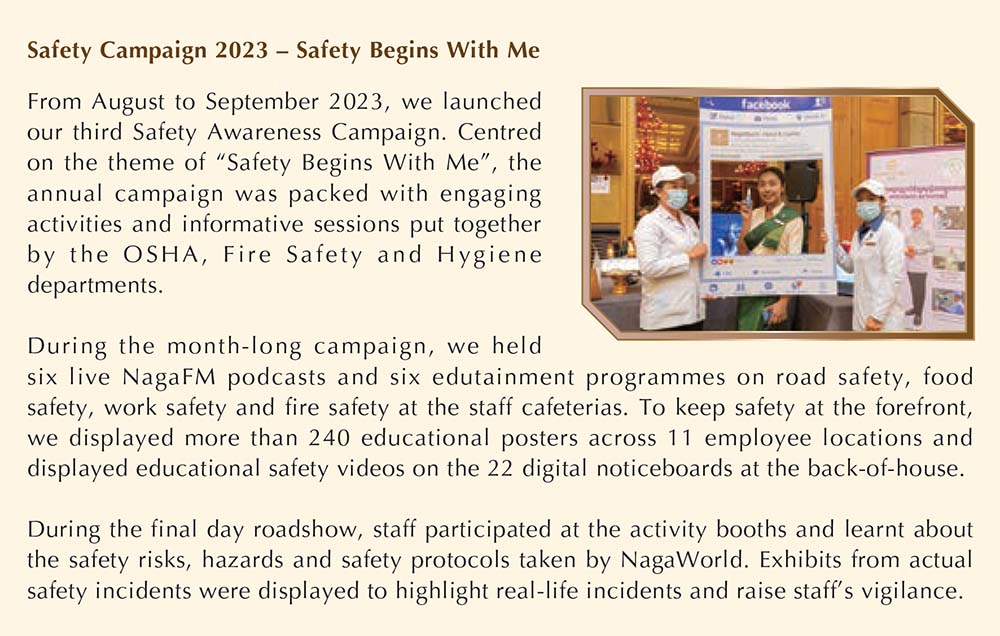
Giveaways at the Green, Health and Safety Campaign 2024 include reusable water bottles and first aid kits.
1.2 Safety Performance
In measuring the effectiveness of our safety protocols and training, we track and perform data analysis on our safety performance and incident report findings. The common work-related injuries are associated with hand injuries, slips, trips and falls. In 2024, our Lost Time Injury Frequency Rate (“LTIFR”) remained low. There were no work-related fatalities or high-consequence injuries during the Year.
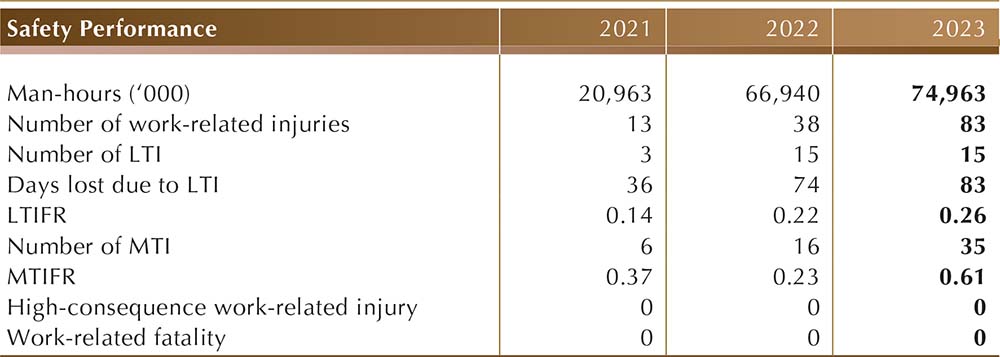
Notes:
| (1) | LTIFR = Number of Lost Time Injury (“LTI”) x 1,000,000/total man-hours. LTIs are events where the employee cannot return to work within two days after being checked by the in-house clinic and referred to a panel clinic for additional treatment. |
| (2) | MTIFR = Number of Medical Treatment Injury (“MTI”) x 1,000,000/total man-hours. MTIs are events where the employee cannot return to work the same day or the next day after being checked by the in-house clinic and referred to a panel clinic for additional treatment. |
| (3) | Total number of work-related injuries is the sum of LTI, MTI and first-aid cases. |
2. Customer Well-being and Satisfaction
Delivering top-quality experiences and services is central to everything that we do. We aim for excellence in our offerings and prioritise our customers’ well-being at all times. Being a service-driven business, our products primarily relate to the F&B offerings prepared by our kitchens. Stringent policies and standards are in place to ensure we deliver on our promise of hospitality excellence to our guests.
2.1 Food Safety
Our F&B offerings are prepared to the highest standards, using only the best quality ingredients and adopting strict food preparation methods. We take food safety seriously and abide by relevant local and international standards. From the gate to the plate, we adopt measures exceeding regulatory compliance. Led by a team of trained hygiene specialists, we believe NagaWorld is one of the leading hotels in Cambodia with robust internal controls on food safety. Annually, we conduct supplier hygiene audits on our F&B suppliers and a Food safety supplier workshop. In 2024, all restaurants in NagaWorld were certified with an “A” rating by the Ministry of Health.
2.2 Fire Safety
Our Fire Safety Department (“FSD”) consists of trained professionals providing comprehensive fire-fighting and emergency medical response capabilities across the entire resort complex, ensuring 24/7 safety for both guests and employees. The FSD maintains a proactive approach to fire safety, continually improving their skills, knowledge, and fire-fighting systems through rigorous training programmes. These programmes include simulations of various fire scenarios and emergencies. The FSD also conducts announced and unannounced emergency drills to ensure all employees are response-ready for evacuations. In addition, our properties are equipped with fire sprinkler systems that protect public areas and hotel rooms, and CO2 and FM200 fire suppression systems that protect high-risk areas such as kitchens.
2.3 Customer Engagement
Engaging with our customers on their experiences allows us to understand their needs and exceed their expectations. Our dedication to delivering outstanding hospitality is exemplified through our Guest Service Policy. To foster closer engagement with our guests, we leverage several channels to facilitate communication. For example, our website, online review platforms, social media channels, rewards programme and restaurants’ guest feedback cards. We investigate all guest complaints and track incident logs until they are resolved. To reduce the recurrence of complaints, guest profiles are updated in our system.
3. Responsible Gaming
In mitigating the potential harm to our guests that may arise from problem gaming, implementing responsible gaming practices that safeguard the well-being of our guests is of paramount importance to us. During the Year, we maintained our responsible gaming initiatives, including security procedures to prevent minors and prohibited players from accessing our gaming facilities, and providing guests with a voluntary self-exclusion or third-party option supported by advanced facial recognition systems.
To enhance our responsible gaming programme, we identified and evaluated third party accreditors to benchmark ourselves against industry best practices. To achieve this, we anticipate concentrations in areas such as staff training and raising customer awareness.
Besides guests, we maintained our duty of care towards our employees by enforcing a strict code of conduct prohibiting employees and their family members from engaging in gaming activities operated by the Company.
4. Sustainable Supply Chain
We prioritise procuring locally as the socio-economic impacts are multi-fold to our community. It supports local SMEs, livelihoods and job creation in Cambodia, where we operate. Procuring locally is also more environmentally friendly due to the lower GHG emissions from transportation. In 2024, by supplier count, 81% of our suppliers were from Cambodia and 95% were from the region (including Cambodia).
Supporting local agricultural cooperatives
In 2024, we partnered with the Cambodia Safety Vegetable Union of Agricultural Cooperative (“CSVUAC”) to supply vegetables such as bok choy and cauliflower to our kitchens.
Supported by the Ministry of Agriculture, Forestry and Fisheries, the CSVUAC promotes the Cambodia Good Agricultural Practices. CSVUAC works with agricultural cooperatives to enable smallholder farmers to gain market access and to secure better pricing for their produce through improved economies of scale.
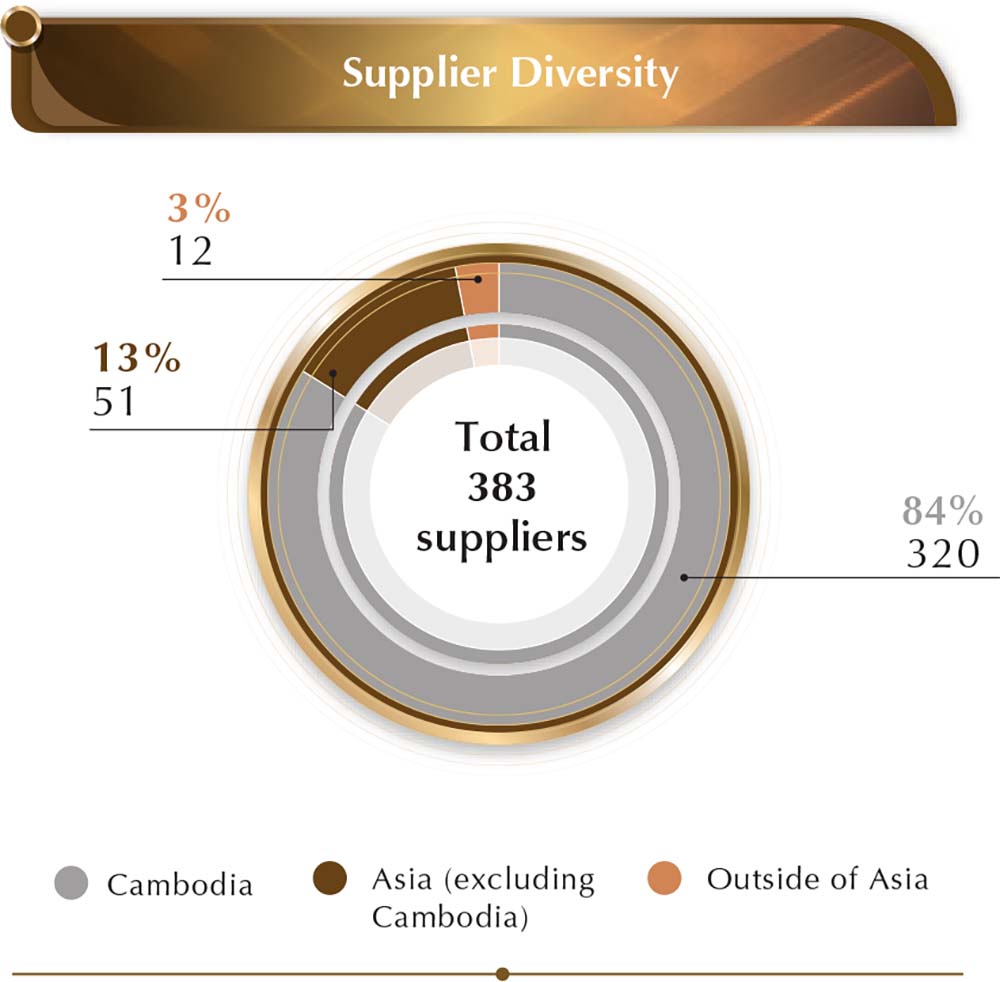 |
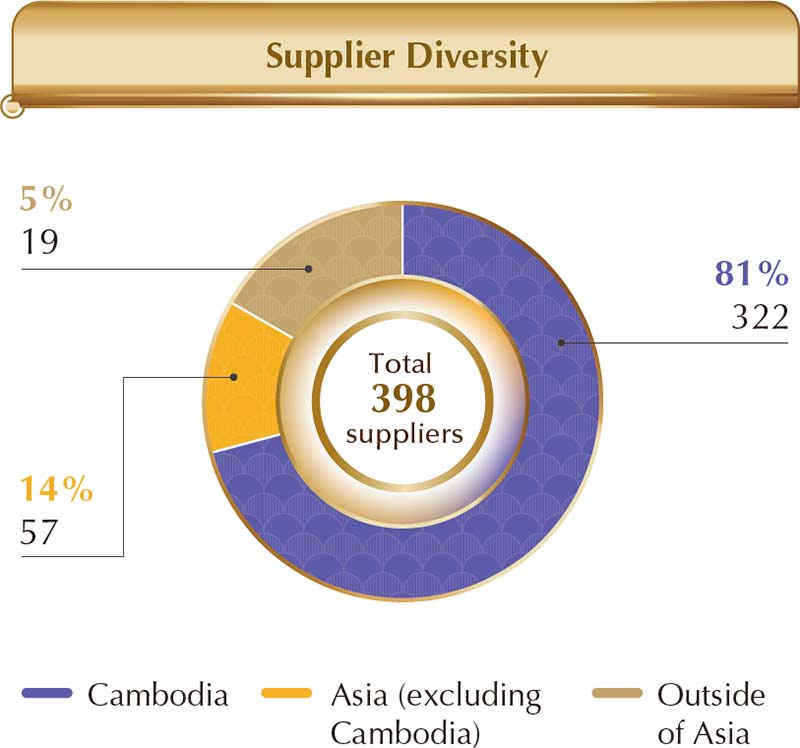 |
4.1 Responsible Procurement Practices
Our Purchasing Terms and Conditions communicate our zero-tolerance stance on child labour. All suppliers must acknowledge their acceptance of our requirements. For service providers such as on-site maintenance contractors, our security protocol includes checking if they are of legal age to work before issuance of the visitor pass. To our knowledge, no child labour was found in our supply chain in 2024.
We prefer goods with a lower environmental and social impact in our procurement where possible. For example, the OSHA and Hygiene departments review the material safety data sheet of cleaning chemicals before we purchase them. For printing paper, only Forest Stewardship Council-certified paper is used. All tissue paper products in our hotel rooms are made from FSC and Programme for Endorsement of Forest Certification-certified pulp. All hotel shower amenities have been changed to recycled PET bottles since 2023.
4.2 Supply Chain Assessment
In understanding the sustainability efforts of our supply chain, we conducted our first supply chain assessment in 2023. We focused on our gaming supply chain, as gaming revenue constitutes most of our total revenue. There were also lower barriers to obtaining information compared to our supply chain supporting hotel operations.
The assessment revealed that our gaming-related suppliers possess high sustainability awareness. Several have implemented green practices such as using recycled materials, waste recycling, and implementing energy efficiency measures in their production process. For example, all our playing cards are made from FSC-certified paper.
For more information, please refer to page 87 of Annual Report 2023.
4.3 NagaFarm
Established in 2020 and situated in the Ang Snuol district, NagaFarm exemplifies our efforts into supplying natural produce to our kitchens that is grown chemical-free. More than 50,000kg of farm produce from NagaFarm was delivered to NagaWorld’s kitchens in 2024.
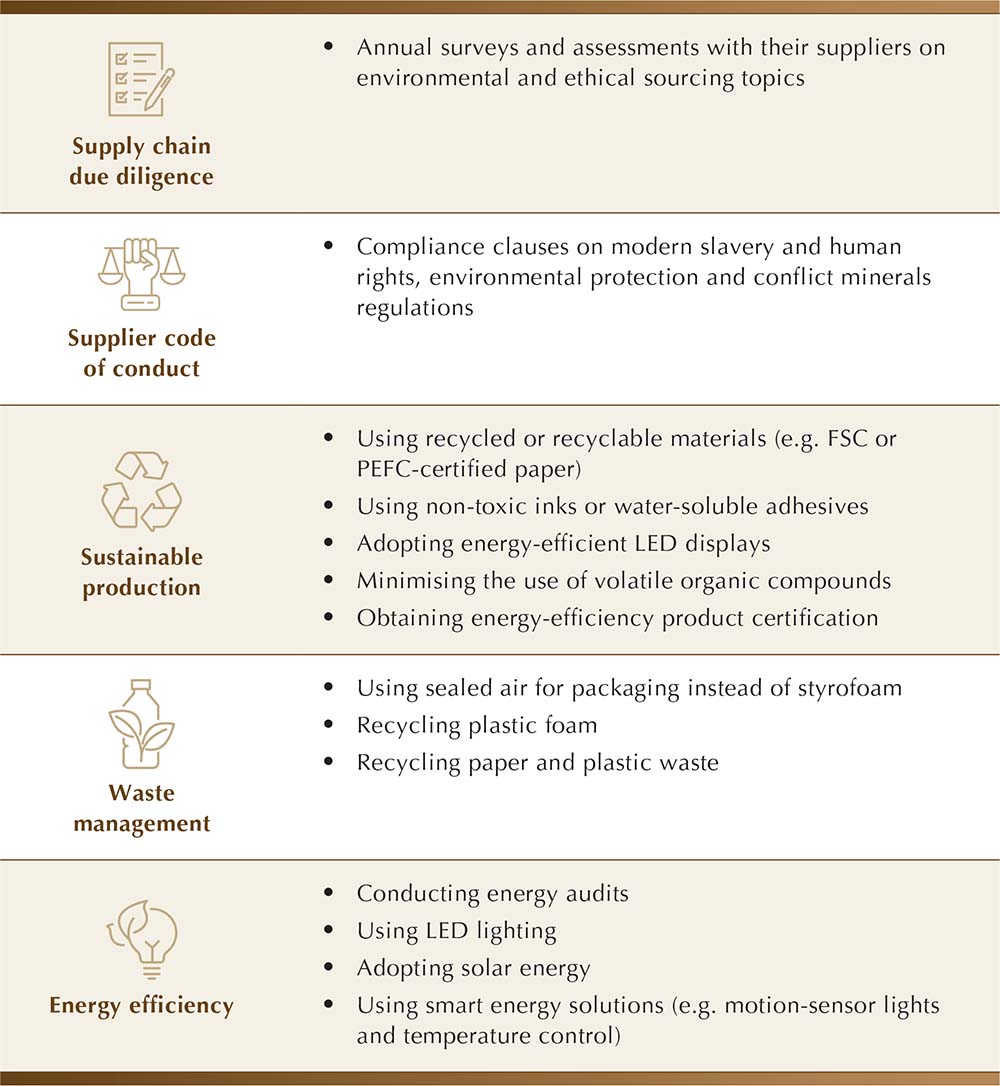
Since 2022, NagaFarm adopted Black Soldier Fly (“BSF”) composting, significantly contributing to the valorisation of food waste from NagaWorld. On a weekly basis, an estimated three tonnes of food waste from NagaWorld is diverted to NagaFarm. This accounts for about one third of NagaWorld’s food waste in 2024. The BSF transforms food waste into high-protein animal feed and soil fertiliser for cultivating fish, chickens and vegetables at NagaFarm. The BSF frasse, when applied to the fields, increased the rice yields.


























































































































































